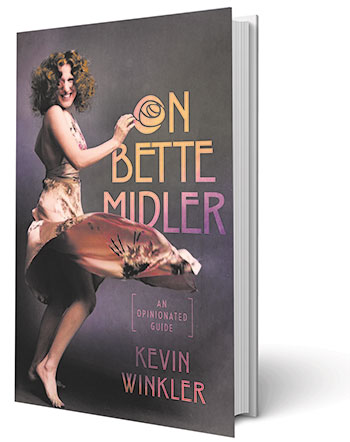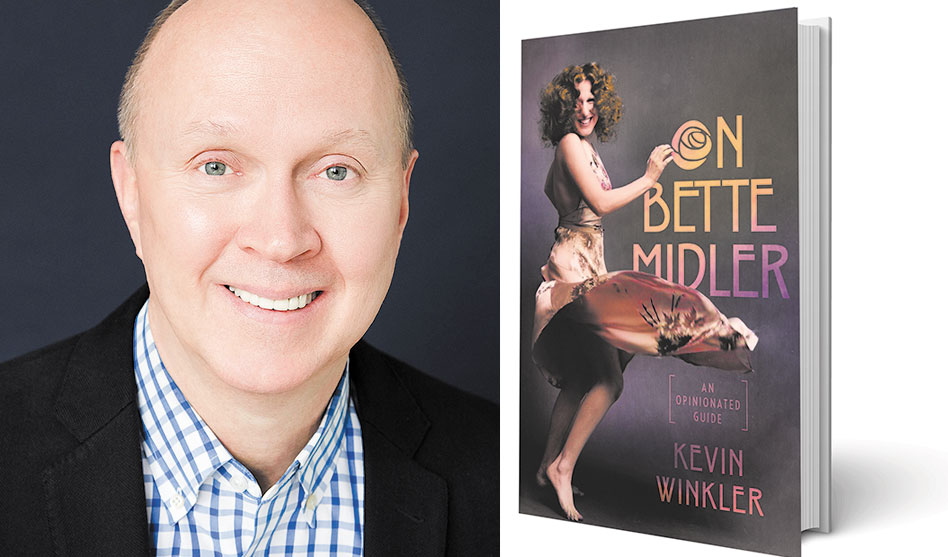An interview with ‘On Bette Midler’ author Kevin Winkler
GREGG SHAPIRO | Q Music
GreggShapiro@aol.com
In her own distinctive way, the divine Bette Midler has been telling her own story throughout her career. Via her music, stage shows, movies, countless TV appearances, on the page and through her activism, Midler has kept us abreast (sorry, I couldn’t resist) of who she is.
With his new book, On Bette Midler: An Opinionated Guide (Oxford University Press, 2024), gay writer Kevin Winkler has taken on the task of not only tracing Midler’s personal chronology, but also taking an in-depth look into her performing life; warts and all.
Winkler succeeds in being both entertaining — he doesn’t hold back in his running commentary — and informative — if you didn’t know about the early 1970s video of Midler performing Joni Mitchell’s “For Free” at the Continental Baths, available on YouTube, you do now.
Kevin was gracious enough to answer a few questions as the book hit shelves this month.
Gregg Shapiro: Kevin, both of your previous books, Big Deal: Bob Fosse and Dance in the American Musical and Everything is Choreography: The Musical Theater of Tommy Tune, deal with choreographers and choreography. Would you say that dance is where your primary interest lies? Kevin Winkler: Generally, yes. I was a professional dancer in New York City for several years, and I’m particularly interested in the development of dance in musical theater. Hence, the subjects of my first two books.
 Was your new book, On Bette Midler: An Opinionated Guide, written specifically for Oxford’s On series, or was it written and then accepted for the series? Oxford’s On series has been, I believe, rather loosely defined. I had been thinking for some time that Bette Midler’s influence as an artist and as a major conduit of gay sensibilities to a broader audience had been somewhat forgotten. After reading a couple of the On series, I decided that someone should write a similar book on Midler. It took me about 10 seconds to decide I was the one to do it! After submitting a formal proposal to Oxford, I was given a contract to write the book.
Was your new book, On Bette Midler: An Opinionated Guide, written specifically for Oxford’s On series, or was it written and then accepted for the series? Oxford’s On series has been, I believe, rather loosely defined. I had been thinking for some time that Bette Midler’s influence as an artist and as a major conduit of gay sensibilities to a broader audience had been somewhat forgotten. After reading a couple of the On series, I decided that someone should write a similar book on Midler. It took me about 10 seconds to decide I was the one to do it! After submitting a formal proposal to Oxford, I was given a contract to write the book.
The new book is divided into four sections: “Bette Midler’s Theater,” “Bette Midler’s Recordings,” “Bette Midler’s Television” and “Bette Midler’s Movies.” Why did you choose to arrange it in this way? I wanted to explore Midler’s development as a multi-platform artist, one who has excelled in a variety of media. Concentrating on her work separately in each area allowed me to dig deeper and more inquisitively. I tried arranging the book chronologically, but it felt muddled. This arrangement gives the book a sense of clarity. At least I think it does.
In terms of the book being “an opinionated guide,” you appear to have reserved your most rigorous criticism for Bette’s recordings. I adore Midler as a recording artist and can think of a half dozen of her albums I would take with me to a desert island. But not all of her recordings are the equal of her best work. My opinion is that her least successful recordings are ones where she sands off the rough edges of her voice and personality — the very qualities that make her so unique — and tries for a more generic “pop” sound. She ends up sounding rather ordinary and not like the devastating singing actress she is.
Bette’s connection to the queer community is a central component of her professional and personal life. As a teenager, I was fortunate to attend two of her 1977 concerts in Chicago. I wasn’t out yet, but I knew that she was speaking to me through her music which I had been listening to for a few years. Would you say that, as a gay man, you felt drawn to her in a similar way? Oh, absolutely! As I say in the book, she took the boys from the Continental Baths with her as she moved into the mainstream, and acclimated straight audiences to our sensibilities. She was every mouthy girl who ever stood up for her gay friends. I responded to her emotional transparency, her humor which clearly acknowledged the gay men in her audience, and her fearlessness. As someone who felt different and fearful of not being accepted, she made me think that if she was that fearless, maybe I could be, too.
Would you agree that it’s Bette’s time to be inducted into the Rock & Roll Hall of Fame? And what do you think her chances are of being an inductee? Midler is definitely worthy of induction into the Rock & Roll Hall of Fame, but I have a feeling it won’t happen. Despite the rock bona fides of her earlier days, today Midler is most associated with what she calls her “inspirational ballads,” like “Wind Beneath My Wings” and “From a Distance.” The people who make the decisions about who gets inducted sometimes have short memories, so I suspect this is one honor she won’t receive, regrettably.
As you mention in the book, Bette is “just an Oscar short” of being an EGOT. Do you think that there might be a movie role out there for her that will someday earn her an Oscar? Sure. Hope springs eternal! Midler is still going strong in movies and has a new film coming out this summer. A choice supporting role would be the perfect vehicle for her to ride all the way to an Oscar. As I mention in the book, one of her most finely-judged performances was in a little-seen film called Then She Found Me from 2007. Midler played a New York talk show host, sort of like Oprah Winfrey, who reconnects with the daughter she gave up for adoption decades earlier. The film starred and was directed by Helen Hunt, and her scenes with Midler are a highlight of the film. If the film had been more widely seen, I think Midler might have gotten some Oscar love.
How do you think Bette would feel about your book? Oxford has sent her a copy of the book, and I don’t know if she’ll even read it, but if she does, I hope she recognizes that it’s the work of someone who greatly admires her as an artist. I revere her work and wanted to discuss it at length — to pick it apart and examine it in all its complexity and all its joy.
Have you started thinking about or working on your next book project? Yes, I’m at the very beginning of working on a new project. I’m superstitious about discussing projects too early, but it’s a move back to the world of Broadway dance.




